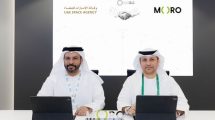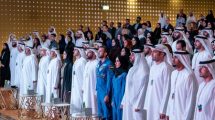 A team of Emirati students and engineers will conduct a reduced-gravity parabolic flight experiment over Japan later this month, as part of the UAE Space Agency’s capacity building program launched last year in collaboration with the Japan Aerospace Exploration Agency (JAXA).
A team of Emirati students and engineers will conduct a reduced-gravity parabolic flight experiment over Japan later this month, as part of the UAE Space Agency’s capacity building program launched last year in collaboration with the Japan Aerospace Exploration Agency (JAXA).
The team arrived in Japan for a series of lectures, experiments and hands-on training sessions from leading experts at renowned Japanese institutions. In addition to parabolic flight experiments, the young Emirati space pioneers will also receive theoretical training and practical experience in launching rockets, hybrid propellants and polymeric materials.
The two-week training program is the UAE Space Agency’s latest capacity building initiative, and aims to increase national space science capabilities. The students and young engineers include winners of the Ideathon, held November 12 with participants from JAXA. The Ideathon competition, in which teams of university students presented proposals for innovative space projects, was won by a team of students from UAE University.
Participating institutions include the Chiba Institute of Technology, where the Emirati team will spend a week at the Institute’s various campuses. While there, they will receive training in rocket theory and safety procedures before launching model rockets. The students and engineers will then study the science and engineering of polymeric materials, which will include hands-on training and combustion experiments.
The team will then travel to Wakayama in Western Japan, home to Cosmo Park Kada, where they will launch hybrid rockets. Hybrid rockets use two different types of propellants — one solid, the other gas or liquid — and have common application in space exploration and suborbital flight.
The parabolic flight experiment will take place at Nagoya Airport on January 13 and 14. Parabolic flight allows people aboard an aircraft to experience weightlessness for roughly thirty seconds at a time by rapidly ascending and descending at steep angles. The process is used for training astronauts and conducting research experiments in a low- or zero-gravity environment.
Dr Mohammed Al Ahbabi, Director General of the UAE Space Agency, said: “This latest initiative of our capacity building program represents the significant progress being made by the UAE in the field of space science education. The training and experiments being held here in Japan over the next two weeks will contribute significantly to our vision of creating a generation of young space pioneers capable of leading regional efforts to explore and utilize space peacefully. This is a central aspect of our commitment to assisting the UAE in its transition to a knowledge-based economy, in line with UAE Vision 2021.”
Al Ahbabi continued: “Furthermore, the training program being held in collaboration with our trusted Japanese partners is a manifestation of the deep and longstanding bilateral ties developed throughout the global space community. International cooperation forms the cornerstone of our long-term vision for the growth of the UAE space sector and industry, and we are proud to have established significant partnerships with various Japanese institutes and entities. Our efforts in this regard have resulted in the Global Space Congress, being held at the end of the month.”












Add Comment